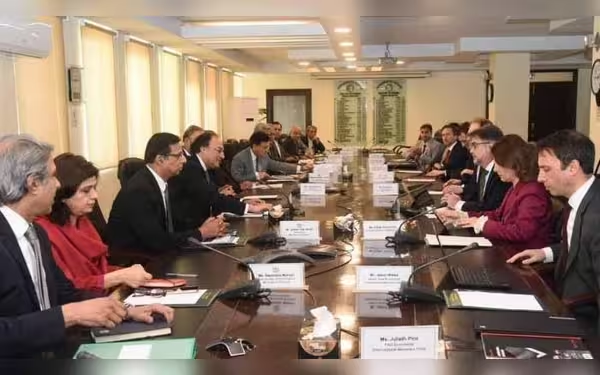Thursday, July 4, 2024 06:35 PM
IMF proposes tax reforms to boost Pakistan's revenue
- Pakistan considering tax changes to meet revenue targets
- IMF recommends harmonization models inspired by Australia and India
- Proposed reforms aim to modernize tax system and enhance revenue collection
 Image Credits: dailythepatriot
Image Credits: dailythepatriotPakistan is exploring significant tax reforms under IMF guidance to boost revenue collection and modernize the tax system, aiming for sustainable economic growth and fiscal stability.
Pakistan is contemplating significant changes to its tax system as it aims to achieve an annual collection target ranging from 112 trillion to 115 trillion rupees. The International Monetary Fund (IMF) has put forth two tax harmonization models, drawing inspiration from Australia and India, to overhaul the existing tax structure.
The proposed reforms include the imposition of an 18 percent general sales tax on petrol and diesel, with the government intending to maintain the revenue collected from the provinces. Currently, Pakistan's tax system faces challenges such as a fragmented tax structure between federal and provincial levels, a narrow tax base on goods, preferential tax treatment for specific supplies, and extensive lists of tax exemptions.
The IMF is recommending the adoption of either the Australian model, where the central administration sets tax rates independently, or the Indian-style Central Value Added Tax (CVAT) system, which involves unified tax administration between federal and provincial authorities. By implementing the IMF's suggestions on general sales tax, Pakistan could potentially generate an additional revenue of Rs 1,300 billion.
The Fund advocates for the removal of zero-rating on all goods except for exports, proposing an 18 percent general sales tax rate on most items. Furthermore, the IMF suggests limiting exemptions on residential property sales and aligning fuel tax rates with regional standards to enhance revenue generation.
To boost tax revenue, the IMF advises reducing concessional tax rates, eliminating disruptive tax policy changes like minimum tax and surtaxes, and streamlining sales tax expenditure. The ultimate objective is to increase tax revenue to 1.3% of GDP by standardizing tax rates across all items and ensuring effective tax enforcement.
The proposed tax reforms in Pakistan, guided by the IMF's recommendations, aim to modernize the tax system, broaden the tax base, and enhance revenue collection. By aligning with international tax models and eliminating exemptions, Pakistan seeks to achieve sustainable economic growth and fiscal stability.













